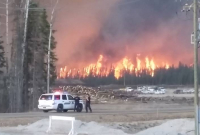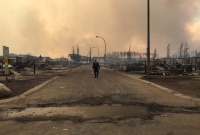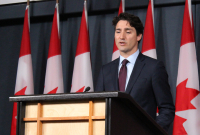Support strong Canadian climate journalism for 2025
In an incendiary opinion piece, former fossil fuel executive and climate change denier Gywn Morgan uncouples the Fort McMurray wildfire from climate change.
“Tying any single extreme weather event to atmospheric CO2 concentrations simply isn’t historically or scientifically credible,” Morgan contends in a Globe and Mail opinion piece published earlier this week.
Morgan's comments seek to undermine those made by the premiers of British Columbia and Ontario, linking climate change to the devastating fire.
What’s particularly galling about Morgan’s bizarre rant, though, is his nerve in attacking other countries on their human rights records.
He writes: “Here’s a note to those who celebrated the Fort Mac disaster as divine environmental justice: Shutting down the Canadian oil sands altogether would reduce global greenhouse gas emissions by a minuscule one-tenth of a per cent, only to be replaced by oil from countries whose environmental and human-rights records are vastly inferior to Canada’s.”
Without the least sense of irony, the former founder and CEO of Encana writes that he’ll “take the values contained in their made-in-Canada oil over that Middle Eastern and North African stuff any day.”
First of all, I doubt many people “celebrated” the fires in any way.
Most people felt nothing but compassion and heartache for the Northern Alberta’s city residents who were forced to vacate their homes.
Encana's environmental record nothing to boast about
And when it comes to the subject of environmental and human rights records, Morgan doesn’t seem to have have a lot to boast about.
“‘As a young engineer in 1975,’” Morgan wrote in a Vancouver Sun column. ‘“I directed the fracking of the very first well drilled by the company that eventually grew to become Encana Corporation. Since then, Encana has safely fractured tens of thousands of wells on its way to becoming North America’s largest natural gas producer.”’
Filmmaker Nadja Drost's 2005 film entitled 'Between Midnight and the Rooster’s Crow,' followed Encana’s development of a heavy crude oil pipeline from the Amazon in Ecuador to the Pacific coast. Drost’s film included interviews with farmers, Indigenous community representatives, environmental activists and others, who related tales of forced relocation, imprisonment and intimidation, “including shootings and beatings by the Ecuadorian police and army who protected Encana’s pipeline.”
The pipeline project also came under fire from a tropical ecologist, Robert Goodland, who authored a document called the Goodland report that outlined major threats to biodiversity and indigenous peoples in Ecuador.
Canada's dominance as fossil fuel empire fading
Journalist Andrew Nikiforuk noted that the pipeline ended in “allegations of corruption, kidnappings, restless natives and environmental degradation,” and says that ultimately Morgan sold the whole venture to a consortium of Chinese energy companies including Petro China for $1.4-billion.
Back home, Encana’s fracking in B.C. “turned quiet rural roads into industrial zones clogged with hundreds of fracking trucks. Farmers and ranchers complained about the heavy traffic, sour gas leaks, air pollution, property devaluation, livestock deaths and the industrialization of rural life,” Nikiforuk wrote.
During Morgan’s time as board chairman at SNC-Lavalin Group Inc., the company became embroiled in a series of bribery and corruption scandals stretching from Libya and Algeria to Bangladesh.
In his Globe piece, Morgan expresses the sentiment that his “vote goes to the made-in-Canada oil produced by those resilient Canadians who have been forced to endure job loses, destructive wildfires and environmental extremist schadenfreude as they proudly anchor a crucial economic cornerstone of our country.”
Morgan can defend the tar sands all he wants. Canada’s moment and opportunity is to turn rapidly towards renewable energies now, to become a leader at the cusp of fighting climate change through sensible governmental policy.
He's clearly yesterday’s man.







Comments
Hgh Fragment 176-191 Benefits
To assist eliminate dark groups or hand bags within your eyeballs, you really should use frosty spoons. The chilly from your place helps to constrict bloodstream that can cause swelling, poofiness, and slight discoloration. To work with this method, put the table spoon in the window of frosty drinking water. When it is quite cool, merely spot a single less than every single eye for a couple of moments.
ansomone 100iu kit
The simplest way to earn profits in forex trading is usually to industry within the long term. It's easy to get suckered into simple-word or time buying and selling, nevertheless the most significant earnings are seen more than months and also several weeks. Currency exchange styles vary depending the trends of large financial systems, and large financial systems don't transform quickly.
human growth hormone injections vs pills
An important suggestion to think about regarding being a parent is to make sure that you are usually providing opportunities for them to discover by themselves. In the event you method tasks in a manner that causes them to be feel in charge, they could be delighted to do them. It is a good way for the kids to build self-esteem and and also to enable them to learn to be self-sufficient students.
Viagra Suisse Ordonnance
Le Coq Sportif Schoenen Eindhoven
While it is not a good idea to use your a credit card too often, additionally you, do not want them to remain inactive for days on end. An inactive credit card will not likely help your credit rating. Some companies will end a cards if it is not used for some time, which can injured your credit ranking.
https://www.royale-t.nl/images/tru2/19936-verkooppunten-adidas-stan-smi…
If you are looking at developing a loyal subsequent for your personal blog site, go with a matter that you are considering and know a lot about. Then adhere to that subject for the most part. Should you continuously offer information linked to a specific matter or style, viewers will keep coming back to look for new information and facts.
https://www.roncallicourier.nl/images/dek2/4239-boss-riem-bruin.jpg